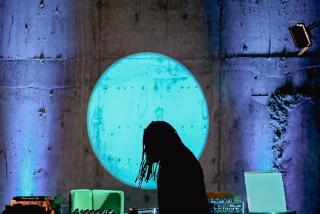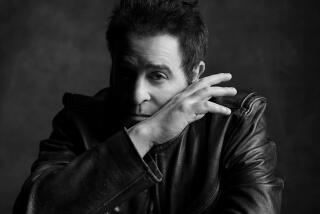Race Against Time : Musician Battles Hearing Disorder While Striving for a Place on Charts
- Share via
The choir director at Cal State Northridge thinks Ed Corkhill has a brilliant future as a songwriter.
That is, if Corkhill doesn’t run out of time first.
Ever since the musician was a teen-ager, the volume on his hearing has been fading because of a genetic disorder. And now, at 42, Corkhill’s ability to hear has reached a temporary plateau, even though it is less than half what it was when he was born.
“The reason Ed can write songs so well is because he hears the music in his mind,” said Elmer Heerema, CSUN choir director. “Even without the use of his ears, he has a tremendous gift.”
Heerema and the CSUN choir agreed in March to record one of Corkhill’s songs, “Home for the Holidays,” so it could be sent to entertainer Perry Como. Sometime in the next few weeks, Corkhill and the choir should find out if Como is interested in using the song for his Christmas variety show. If Como buys the song, it will be Corkhill’s third to be published. The first two were published in the early ‘70s, although neither made the charts.
But the Christmas song is just one of dozens that Corkhill has been working on since his graduation from CSUN in May. His goal is to have a song on the pop and R & B charts before his hearing worsens.
Corkhill believes in being realistic. He graduated with a degree in leisure science so he can work as an administrator in a national park or forest one day if his hearing goes before he has time to make it big with music.
“It is literally a race against time,” said Corkhill, who wears hearing aids in both ears. “I have so many songs in my head that I want to put on paper. And I don’t know if I can keep writing if I lose much more hearing.”
Like others who are afflicted with the genetic sensorineural hearing loss, a day will eventually come when Corkhill will be nearly deaf.
“This kind of hearing loss can plateau for a few months or as long as a decade sometimes,” said Bruce Chatterton, a clinical audiologist for the Hearing Care Associates in Sherman Oaks. “But eventually, if the genetic loss tends to be severe, the person will lose whatever hearing they have.”
Five of the seven siblings in the Corkhill family have the same hearing disorder as their father, who today is nearly deaf.
“Dad has maybe 5% or 10% of his hearing left,” Corkhill said. “And I know the facts. The odds are I’ll wind up the same way.”
Among people with early hearing loss, Chatterton said about 25% involve a genetic disorder such as Corkhill’s.
Chatterton said that it is remarkable for someone with a genetic hearing disorder to write music because the sounds a person can pick up through hearing aids are usually muffled and distorted.
But Corkhill’s hearing wasn’t always muffled and distorted.
When he graduated from his San Benito, Tex., high school in 1963, Corkhill played the drums and keyboard for a band called the Gauchos. In its prime, the band toured with the Righteous Brothers and in 1965 performed on the ABC-TV variety show, “Shindig!”
But hours of practicing and playing musical instruments on a stage covered with towering amplifiers took their toll on Corkhill’s hearing. Because of his family history, he knew there was a chance he would have the genetic hearing disorder. But when the sounds Corkhill was picking up didn’t seem quite as crisp as they once had been, he ignored it and continued playing with the Gauchos.
By 1968, when Corkhill was 23, a doctor confirmed his suspicions--he had the disorder and was going deaf at an alarming rate.
“The doctor told me to stop performing, stop being around loud music or I could wind up deaf in a year,” Corkhill said.
But music was all Corkhill knew and his performing career as an instrumentalist was just getting off the ground. He ignored the doctor’s warning and in the weeks that followed he left the Gauchos and began practicing with the Beach Boys. Although he never performed with the famous group, the practice gained him recognition and led to his playing with several of the Gauchos who had started a new band in Sacramento called Gauchos-6. In 1972, he began performing with a group called Brother Frog, which sang Corkhill’s two published songs, “Stop That Train” and “It’s Up to You.”
“It’s unusual being part of a family where most of the members are deaf or going deaf,” said Maryann, Corkhill’s sister and one of two Corkhill siblings unaffected by the genetic disorder. “It’s to the point where we just accept it. Some families have dark hair, some are short, we just happen to have deafness that runs in the family. The thing is, nearly everyone in the family also has a love of music.”
Their father, Joe Gonzales (Corkhill uses his mother’s maiden name), began writing songs when the family was in Texas. When Gonzales realized he was going deaf, he gathered 20 of his best pieces and pitched them to a Hollywood producer, Ed Corkhill said. When the producer showed interest, Gonzales packed the family into a station wagon, strapped all their belongings on top and headed for California.
“But while we were driving here, a ferocious windstorm came up and when we got through it we realized everything on top of the car had been blown away,” Corkhill said. “Dad’s songs were on top of the car. After that he was never really the same again.”
The family continued to California anyway and Gonzales took odd jobs to support the family.
“He thought his dreams died in that windstorm,” Corkhill said. “But really they were just passed down to us kids.”
Corkhill became more obsessed with seeing his dream of making it as a songwriter when in 1976, at age 31, his hearing suddenly became worse, forcing him to wear hearing aids to understand what people around him were saying. By then, several high notes on his keyboard were no longer audible and none was as clear as they had been. In a matter of weeks, he stopped performing and moved to Hollywood to work as a technician at Universal Studios.
“I fell into a deep depression at that time in my life,” Corkhill said. “It was like for the first time I was realizing the truth--my career as a musician was over.”
In 1984 Corkhill enrolled at Kings River College near Fresno and began taking courses in forestry--to fall back on in case he went completely deaf--and music composition.
“I discovered then that I could still express my love for music by being in a quiet room all by myself,” Corkhill said.
After earning an associate of arts degrees in forest technology and music, he enrolled at CSUN in 1987. By then, even though he was no longer around loud music, Corkhill had lost more hearing and had decided to focus on a career in forestry.
“I was still writing music, but it looked like I would have to make a living doing something else,” he said.
Then, in 1989, Corkhill’s hearing reached the plateau that doctors say can last as long as a decade. Early this year, he decided to delay his forestry career and spend his time writing songs until his hearing loss forces him to stop. Heerema and the CSUN choir performed his song “Home for the Holidays” two months later.
“He is extremely talented,” Heerema said. “He has what it takes to write for someone like Perry Como because his ballads are centered around family values and homemade memories. He’s facing a once-in-a-lifetime opportunity.”
The CSUN choir plans to perform Corkhill’s song next fall in its holiday musical, Heerema said.
“When a person has that type of genetic hearing disorder, they could wake up one day and suddenly find the plateau period is over and their hearing is much worse,” Chatterton said. “A person with that disorder really never knows from one day to the next how much worse his hearing will be.”
And so Corkhill is writing songs as if his life depended on it.
In his race against time, Corkhill is also working on perfecting his musical pitch. Perfect pitch, which is very rare even among successful musicians and songwriters, means the artist can identify any note simply by hearing it. Beethoven, who spent the latter part of his career deaf, had perfect pitch.
“The closer I come to perfect pitch, the longer I’ll be able to write songs,” Corkhill said. “I will always be able to hear the songs in my mind,” Corkhill said. “But without perfect pitch, I won’t be able to write them down when I lose more of my hearing.”
Corkhill shares a townhouse in West Los Angeles with his sister, Maryann Corkhill, 34, and brother, Dan Corkhill, 39. Each is a musician, but only Dan and Ed have been diagnosed with the genetic hearing disorder.
“We don’t see ourselves as poor, pitiful deaf guys who like writing music,” Dan Corkhill said. “We see ourselves as artists first. Artists who face the challenge of deafness.”
Ed Corkhill, who is starting to use sign language in preparation for the time when his hearing fades even further, agrees with his brother.
“I see music as having more to do with the imagination than with my ears,” Ed Corkhill said. “After all, Beethoven was deaf when he wrote his last three symphonies.”
And that puts Corkhill in fairly good company.
More to Read
The biggest entertainment stories
Get our big stories about Hollywood, film, television, music, arts, culture and more right in your inbox as soon as they publish.
You may occasionally receive promotional content from the Los Angeles Times.










